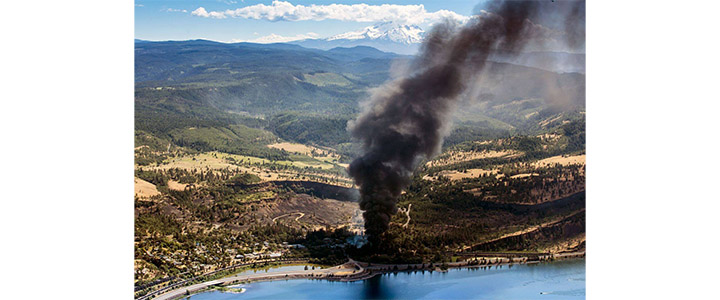Amid the drama of alternative facts and security leaks, the new administration has been unpredictable. And as its anti-environment agenda becomes clearer, Baykeeper's attorneys and scientists are evaluating how best to protect San Francisco Bay from looming threats.

An oil train fire burns along the Columbia River in Oregon in June 2016. Photo courtesy of Columbia Riverkeeper
By Sejal Choksi-Chugh
Published: March, 2017
Amid the drama of alternative facts and security leaks, the new administration has been unpredictable. And as its anti-environment agenda becomes clearer, Baykeeper’s attorneys and scientists are evaluating how best to protect San Francisco Bay from looming threats.
One imminent threat is the administration’s short-circuiting of environmental protections in order to facilitate greater use of oil and coal. If the United States opens more oil pipelines and mines more coal, not only will pollution increase at extraction sites across the continent, pressure will intensify to transport much more oil to the Bay Area for refining. The pressure will also increase to export both oil and coal from Bay Area ports. The risk of oil spills and coal pollution will go up dramatically in the Bay—and in local communities, too.
That’s why Baykeeper is doubling our efforts to stop local expansion of oil and coal. We recently sponsored a new state law that bans state funding for coal shipping terminals. Along with a coalition of groups, we succeeded in getting Oakland to ban coal exports from that city. Now the developer who wanted to export coal has challenged the ban, so Baykeeper attorneys are defending it in court. We are also opposing a development project proposed for Vallejo that may include coal export. And we are working to strengthen state laws to prevent oil spills in the Bay.
With climate change deniers leading the country, the Bay’s wetlands are also under threat. Ongoing efforts to restore the Bay’s wetlands are needed to decrease pollution, increase habitat for wildlife and protect shorelines from sea level rise caused by climate change. But much of this wetland restoration is funded by federal grants that could vanish at the whim of the new Environmental Protection Agency head.
Baykeeper’s legal victories over our last 27 years have resulted in over $10 million in funding to groups that restore San Francisco Bay’s shoreline. We’ll continue to generate this important source of funds. We are also sponsoring new legislation to require that clean dredged sediment be used to restore Bay wetlands, not dumped far out in the ocean. And we’re fighting in court to keep sand in the Bay for marshes and wetlands.
Additionally, the administration has signaled that it wants more water to go to Big Agriculture in the Central Valley—and less fresh water to flow to the Bay and Delta. This could be a death knell for the Bay’s salmon and other endangered fish.
Baykeeper has increased our efforts on behalf of fresh water for the Bay under state and local protections. Our scientists and attorneys are working with partner groups to educate the public, support new policies that would increase fresh water flows to the Bay and oppose the massive twin tunnels that would rob the Bay of fresh water.
Adding to the threats, federal environmental laws that protect the Bay are in the crosshairs of some Republicans in Congress. Since the 1970s, the federal Clean Water Act has been used by citizens nationwide to stop contamination of rivers, streams, lakes and bays. Baykeeper has used this law hundreds of times to reduce pollution in beautiful San Francisco Bay. Now, leaders in Washington have begun attempts to “reform” the law in ways that would thwart organizations that use it to stop pollution.
If local organizations are no longer able to enforce federal pollution laws, the federal Environmental Protection Agency could conceivably step in. But that won’t happen if the EPA is abolished, which a new bill now proposed in Congress would do. An inactive or abolished EPA would also mean that if a developer wants to fill in more Bay wetlands—to build a skyscraper or a condo complex—it will be much harder to stop.
Baykeeper is a founding member of the Waterkeeper Alliance, an organization of hundreds of local groups nationwide working for clean water. Together, we will advocate against—and mobilize the public to oppose—Congressional threats to national environmental protections. Moreover, California has strong environmental laws. On the local and regional level, Baykeeper will leverage our legal expertise to enforce the laws and make them even stronger.
You can help. You can thank your Congressional representatives, state legislators and local officials for strengthening clean water protections. You can stand up for the Bay by taking part in action alerts on Baykeeper’s website. You can clean up trash from the shoreline, and report pollution to our hotline. And you can make a gift to support our work. To learn more, visit us online at baykeeper.org.
Sejal Choksi-Chugh is the Executive Director of San Francisco Baykeeper. Baykeeper uses on-the-water patrols of San Francisco Bay, science, advocacy and the courts to stop Bay pollution. To report pollution, call Baykeeper’s hotline at 1-800-KEEP-BAY, e-mail hotline@baykeeper.org, or click “Report Pollution” at baykeeper.org.

